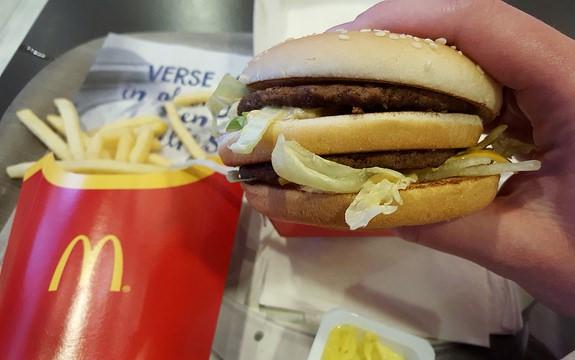Editor's note: This story was updated later on Dec 11 with comments from Paul Plummer, DVM.
McDonald's today announced a new policy to reduce the use of medically important antibiotics in its beef supply chain.
The company says it will partner with supplying beef producers in the United States and nine other countries—Australia, Brazil, Canada, France, Germany, Ireland, New Zealand, Poland, and the United Kingdom—to measure medically important antibiotic use in its beef supply chain and establish reduction targets in those markets by the end of 2020. The countries represent 85% of McDonald's global beef supply chain.
Starting in 2022, the company, which is one of the world's largest purchasers of beef, will begin reporting progress on meeting those targets.
"We are excited to partner with our beef supply chain around the world to accelerate the responsible use of antibiotics, whilst continuing to look after the health and welfare of those animals in our supply chain," Keith Kenny, McDonald's global vice president of sustainability, said in a statement.
Move could have ripple effect
The move comes less than 2 months after a report from a coalition of groups advocating for reduced use of medically important antibiotics in food-producing animals gave McDonald's an "F" for not having a timeline in place for sourcing beef raised without routine use of antibiotics. Matthew Wellington, co-author of the Chain Reaction report and antibiotics program director at the U.S. PIRG (Public Research Interest Group) Education Fund, says the new policy is a big step forward.
"McDonald's is one of the biggest beef purchasers out there, so this commitment should have ripple effects throughout the beef industry," Wellington told CIDRAP News. "When you compare what other restaurants have done on restricting antibiotic use in beef, this is above and beyond that."
McDonald's is the first major burger chain to release a comprehensive policy on antibiotic use in its beef supply chain. In 2017, fast-food chain Wendy's said it would start sourcing 15% of its beef from suppliers who committed to reducing use of one particular antibiotic—the broad-spectrum macrolide tylosin—in their cattle. Two smaller burger chains, Shake Shack and BurgerFi, serve only beef raised without antibiotics.
Given McDonald's size and position in the fast food universe, Wellington suggested the move could spur the type of shift toward antibiotic-free products seen with chicken. McDonald's completed a commitment to serving only chicken not treated with medically important antibiotics in its US restaurants in 2016, and announced in 2017 it would phase out use of medically important antibiotics in its global chicken supply.
"When McDonald's announced that it would cut medically important use from its chicken production, we saw a cascade of other commitments from companies trying to keep up with them," he said.
Wellington, who's been involved over the past year in efforts to get McDonald's to phase out routine antibiotic use in its beef and pork supply chains, also credited the company with putting a lot of thought and specifics into the policy.
"They're setting reduction targets for medically important antibiotic use by the end of 2020, and that is an important detail," Wellington said.
Policy based on WHO guidelines
The McDonald's policy is based on its Global Vision for Antibiotic Stewardship in Food Animals, issued in 2017, and the World Health Organization's (WHO's) guidelines on the use of medically important antibiotics in food-producing animals issued the same year.
The principles in the policy include not allowing use of antibiotics defined by the WHO as medically important for growth promotion or for routine prevention of disease in beef or dairy beef. Non-routine use of medically important antibiotics is permitted "if there is a high risk of contraction of a particular disease."
The policy also prevents critically important antibiotics for human medicine from being used for the control or treatment of the dissemination of a clinically diagnosed infectious disease within a group of animals. McDonald's says it expects application of these principles to result in an overall reduction in the use of medically important antibiotics in its supply chain, and that some of the antibiotics will be replaced with "evidence-based and sustainable solutions" for preventing diseases and protecting animal welfare.
Paul Plummer, DVM, executive director of the National Institute of Antimicrobial Resistance Research and Education and a professor of veterinary diagnostic and production animal medicine at Iowa State University, says the new policy demonstrates that McDonald's understands the need for judicious and responsible antibiotic use in livestock production, while also recognizing that animal health and welfare are "key influencers" of a safe food system.
"Their thoughtful approach provides a strong foundation for successful implementation of the policy, by emphasizing the role of the qualified veterinarian, and using an evidence-based medicine approach in decision-making related to antibiotic use," Plummer told CIDRAP News. "Their continued support and encouragement for producers and veterinarians to seek progressive management approaches that emphasize good husbandry and preventative medicine are equally important."
Implementation of the policy will begin with pilot tests in each of the top 10 beef sourcing markets to establish a baseline use of medically important antibiotics in each country.
McDonald's also announced today that it was joining the Antimicrobial Resistance (AMR) Challenge, a year-long initiative led by the US Department of Health and Human Services and Center for Disease Control and Prevention. The challenge, launched in September, asks public- and private-sector organizations to commit to accelerating the fight against AMR. McDonald's is committing to partnering with suppliers and producers on responsible use of antibiotics in its supply chain.
See also:
Dec 11 McDonald's statement
Dec 11 McDonald's antibiotic use policy for beef and dairy beef
Oct 17 CIDRAP News story "Report urges burger chains to hold the antibiotics"
Sep 26 CIDRAP News story "HHS, CDC issue AMR 'challenge' to public, private sectors"
























